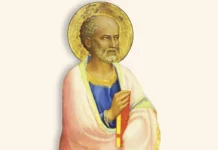The soul of the Bishop of Rheims had the mettle of a hero and the confidence of a prophet. He steadfastly believed in the promise of the conversion of the barbarian tribe that was destined to open a new historic era.
On March 16, 455, Emperor Valentinian III succumbed to the blows of two soldiers from the Imperial Guard, on the Field of Mars. With his death, the Theodosian dynasty perished, the last line to reign over Rome, hastening the end of a declining Empire.
For a further twenty years the throne of the Caesars would be disputed by transient rulers, the playthings of politics or unbridled human passions. Old and worn out, the Roman State disintegrated before its definitive collapse, undermined from within, corroded in its foundations by decadent customs, and political, military, and financial chaos. “Among the Romans there was no longer education, but only moral corruption and intrigues; family life was destroyed.”1
On the other hand, the successive barbarian invasions from the north had weakened the authority and cohesion of the Rome of former times. Nevertheless, “it was not the barbarians that destroyed the Empire, it annihilated itself; the foreigners were merely executors of the death sentence pronounced against the ancient world by the moral order.”2
Within this crucial historical context, Divine Providence raised up great men such as St. Severinus, St. Hesychius, St. Avitus of Vienne—and, later, St. Augustine of Canterbury, St. Boniface and St. Columbanus—to serve as the seeds of a new era germinating from the ruins of the Roman Empire of the West.
These men of God, adorned with the fame of virtue—and often by the witness of numerous miracles—exercised a powerful influence over the barbarians. Albeit fearsome warriors, these men were eager to learn supernatural truths. In contact with prelates and religious they awoke to the morning light of the Christian religion, which appeared to them like the splendour of the dawn.

Bishop of Rheims at 22 years of age
Remigius was born in Laon in 437, from a noble Gallo-Roman family. From a very early age his intelligence and aptitude for oratory garnered the admiration of teachers and classmates. The fame of his eloquence spread to such an extent that in 459, when the Bishop of Rheims died, he was chosen to replace him.
The work of this man of only twenty-two years of age, in heading such an important Episcopal See, soon revealed the wisdom of this choice. In his famous Historia Francorum, St. Gregory of Tours writes: “St. Remigius was a bishop of considerable knowledge who at first had been steeped in the study of rhetoric, but who so distinguished himself by his holiness that he equalled Sylvester in miracles.”3
The charity and kindness of the young prelate soon won over the hearts of the faithful, whom he served devotedly—comforting all those who sought his help with material alms or with consolation and guidance for the soul. However, without neglecting the care of those belonging to the flock of Christ through Baptism, St. Remigius burned with the desire to conquer new souls.
The tribe of the Salian Franks
The north of Rheims, in present-day Belgium, had been settled by the Salian Franks. They were perhaps the most modest of the Germanic peoples in origin, but with the passage of time they had gained preponderance in all fields—especially in the art of warfare. Their qualities did not pass unnoticed by the vigilant Bishop of Rheims who discerned a special design of God hovering over this people. His apostolic heart was moved, and he longed to draw them into the bosom of the Church.
Remigius focused his attention especially on King Childeric who, in 464, returned to his people after eight years of exile in Thuringia. Over the course of sixteen years of patient apostolate, the bishop strove to attract the Frankish leader’s soul to embrace the Catholic Faith. The latter, however, resisted, remaining tenaciously attached to his gods, but maintaining amicable relations with the ecclesiastics and giving them his support.
News one day arrived at the Episcopal See of Rheims that Childeric had died at an advanced age, without expressing the least desire for Baptism. All of Remigius’ efforts were suddenly dashed! The hopes built up over almost two decades suddenly vanished like a mirage…
Had he been deceived? Was the long-cherished dream merely a chimera, the fruit of his imagination?
Clovis succeeds his father Childeric
Many missionaries would have become discouraged in face of this apparent failure, but not the Bishop of Rheims. Steeled by virtue, his soul possessed the mettle of a hero and the confidence of a prophet. Far from disheartening him, the death of the king emboldened the strong-willed prelate.
Childeric left his son Clovis as successor—a 15 year-old adolescent, whom the Franks promptly proclaimed king. It became indispensable to win his friendship from the start and to instil in the youth a holy respect for the Church and its representatives.
Accordingly, Remigius sent him a letter that combined the affection of a father and the authority of a teacher: “In the first place, you must take care that the discernment of the Lord does not abandon you, and that your merit remains at the height to which your humility has led you, since, according to the proverb, the actions of men are judged by their end. You should surround yourself with councillors of whom you can be proud. Do good, be chaste and honest. Show yourself to be filled with deference toward your bishops, and always have recourse to their advice. […] Divert yourself with the youths, but deliberate with the elders, and if you desire to reign, show yourself worthy to do so.”4
This letter was the first step of a long journey that led the young king to the baptismal font in the Cathedral of Rheims.
A heart closed to grace
For ten years, Clovis counted on the friendship and support of St. Remigius in governing his kingdom. And although the Frankish leader showed no signs of openness to grace, the bishop’s influence over him during this period became stronger. “The pagan king learned to bow before the moral superiority of the priest of Christ. […] The man to whom the voice of the people attributed the resurrection of one who was dead would become the instrument for the resurrection of a people.”5
In 491, Clovis’ wife died. Remigius measured the risk to Church interests should Clovis decide to remarry a pagan princess or, worse yet, an adherent to the Arian heresy—knowing how his superstitious wife Basina had opposed his conversion. Therefore he agreed with Avitus, Bishop of Vienne, in proposing that the Frankish King marry Clothilde, the Christian daughter of the king of the Burgundians, who had been educated since childhood by Avitus himself.
Clovis accepted, and the following year the nuptials were celebrated in the city of Soissons, presided and blessed by the Bishop of Rheims. Now the bishop had a powerful ally within the royal household. Indeed, in her fervour, Clothilde was convinced that her union with Clovis gave her the mission of converting him: “she ceaselessly counselled him to become acquainted with the true God and to abandon the idols.”6

The long-desired conversion
The long-desired day arrived in the spring of 496, fifteen years after the royal ascension of Clovis. According to St. Gregory of Tours, the queen bid St. Remigius come to “instil the word of salvation in the king.”7
Starting by an exposition on the futility of idols, the holy Prelate of Rheims instructed the king in the truths of the Faith. He spoke to a rapt Clovis of Our Lord Jesus Christ, his miracles and divine teachings. But when the rustic monarch heard of the sorrowful Passion of Jesus, he was aroused to anger and exclaimed: “Ah! If only I had been there with my Franks!”8
Indeed, his Franks, captivated by supernatural enthusiasm, noted the sovereign’s steps toward conversion and followed his example. When Clovis convoked them to proclaim his decision, they cried in unison: “We reject the mortal gods, pious king, and are ready to follow the immortal God who Remigius proclaims.”9
“Remigius, fear not!”
All was in readiness for the baptismal ceremony to be held the next day, the Nativity of Our Lord. However, during the night Remigius was overcome by a sense of dread…It was a trial characteristic of a soul who treds the path of a prophet. He was tortured by the doubt that he was not working exclusively for God’s glory in his great desire for the conversion of the Frankish king, and that he was, rather, being driven by worldly concerns.
A ray of light suddenly illuminated the utter darkness of the place in which the man of God was praying. It was accompanied by a powerful voiced: “Remigius, fear not!”10 In vision, he then saw the glorious consequences of this Baptism, for Gaul and the Church. The holy bishop had not been mistaken; this event would give rise to a chosen nation, which for centuries would be the supporter of the Papacy and contribute to the flourishing of the Catholic Religion through the ages.
Still in vision, a procession of magnificent warriors filed past the awestruck and venerable ecclesiastic—some of them saints, who put their swords at the service of the Faith. However, this glorious scene was followed by others of desolation: the sad spectacle of this chosen people’s infidelities, sinking into sin and abandoning God. While immersed in these thoughts, fluctuating between joy and horror, another voice, filled with kindness and reassurance, whispered in his ear: “Be not afraid, because I am here, watching over you.”11
Remigius regained his feeling of peace. Now he could advance fearlessly, assured of the most precious help. The Blessed Virgin, as a good Mother, would protect the young Frankish nation.

“Is this the Kingdom of heaven?”
On the following afternoon, still under the effect of this magnificent vision, Remigius set out in cortège through the streets of Rheims, leading King Clovis by the hand, toward the cathedral. The building—much smaller and simpler than the present-day cathedral—was adorned with white curtains and illuminated by thousands of aromatic candles, as a symbol of the spiritual beauty of Holy Mother Church that on this day welcomed the Franks as her children.
“The entire temple of the baptistery was imbued with a divine odour and God showered the assistants with such grace that they felt as if transported amid the perfumes of Paradise.”12 Awestruck by the splendour of the trappings and the hymns, Clovis paused on the threshold of the holy precinct and asked Remigius: “Is this the Kingdom of heaven that you promised me?” The bishop replied “No, but it is the beginning of the way that leads to it.”13
The ceremony unfolded with all solemnity. Three thousand Franks—not counting women and children—received Baptism together with the king. Among them was the king’s sister, the Princess Albofleda, and the small Thierry, child of Clovis’ first marriage.
Like Simeon, Remigius could finally sing: “Lord, now lettest Thou thy servant depart in peace…” (Lk 2:29).
The beginning of a new nation
It was God’s will, however, that Remigius continue his apostolic labour for many years in Gaul. Assured of the king’s protection, Remigius was free to dedicate himself to abolishing idolatry and proclaiming the Gospel of Christ throughout the kingdom. All who drew near him profited: pagans converted, Christians received the bread of doctrine, heretics renounced their errors, and bishops felt encouraged to follow his example.
In the final years of his life, God willed that the venerable brow of the bishop that had been encircled by a halo of glory be crowned with suffering: his body was bent under numerous illnesses that did not, however, dampen his enthusiasm or lessen his charity. Finally, in 530, Remigius surrendered his soul to God at the age of 96, after seventy years of Episcopal ministry.
Far from being lost in the mist of history through the centuries, his figure would shine with growing distinction and would reveal the true magnitude of his soul. By his fidelity to God’s calling, St. Remigius became the prophet of a new era and patriarch of a Catholic nation to which he will always remain associated, as the mediator of the graces that heaven poured out upon it. ◊
Notes







